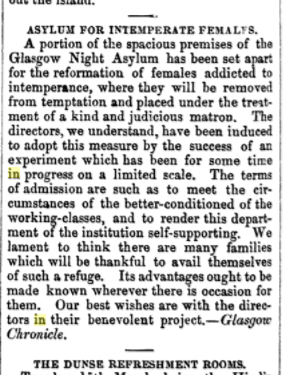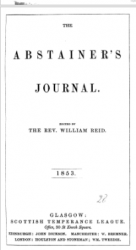Yes, the time has come for each of you ink-stained wretches to park your Prius and go drive a tractor.
(Oh, bring your vodka with you.)
(Sept. 19, 2017) Stumbling through the internet the other day searching for something or other, I came across this small story from the June 1853 issue of The Abstainer’s Journal, a publication run by Rev. William Reid in Edinburgh, a noted member of the Scottish temperance movement back then.

What immediately caught my attention (as I’m sure it did you, too) was the “Asylum for Intemperate Females.” And I was deeply struck, as well as confused, by the euphemism contained in the “reformation of females addicted to intemperance.”
Now, I’ve known plenty of men addicted to intemperate females, but females addicted to intemperance?
At first, I thought that genteel phrase must refer to women who might otherwise be known as “unfortunate women” at its more tasteful, or “bunters” at its worst. But the more I read, the more I came to understand just how innocent I was of not just the language of the time, but the morality as well.
These women were not prostitutes, but something, I now know, just as evil and depraved. They were women who drank alcohol — either those on a nonstop bender, or just women, God bless them, who had a few too many Cosmopolitans at the local Ruby Tuesday. I’m not sure. But either way, times have certainly changed. Thank goodness.
As if that wasn’t enough fun for one day, what kept me reading was the history lesson inside the several hundred pages that were brought to me by Google Books. It’s not just the self-righteous belief that alcohol is bad, it’s the tone and lessons and poems and examples and the pages and pages of “proof” (no pun intended) that the Journal provides. A drunk “platelayer” in Liverpool was hit by a train and “had his head severed from his body.” A drunk woman got hit by a cab and her arm was broken. Five ministers were admonished for various offenses: being drunk in church, drunk on the streets, drunk while “attempting to perform the marriage ceremony,” or for “habitual drunkenness” over an entire five-year span. And, by the way, “a man named Neil” in Edinburgh died after being given a drink of laudanum and alcohol by his wife, who had been drinking. (I’m not quite sure, but it seems that alcohol might not have been the real culprit there.)
So, let these be a lesson to you, whether you enjoy “intoxicating liquors,” “stimulating drinks,” “spirituous or fermented” liquids, or otherwise imbibe substances unacceptable in any of the Teetotal Societies referenced in the journal.
Yes, this Abstainer’s Journal is a page-turner. It goes on and on: “Are the French really a temperate people?” is the headline to one article. (Except for the fact that “the French are a very restless people” moving from café to café, I didn’t really learn the answer, except that it appears to be no, but they drink differently.) “Strong Drink and Crime,” is another you might read. Or, “A Drunkard’s End. A Narrative of Facts.”
And of course, there’s politics, where it seems little has changed — at least if you live in Chicago. Yes, quite interesting.

But then, like most things in history, if you think about them too long, their real lesson starts to show. And I realized how truly illuminating this was — about our journalists today.
Indeed, through no fault of my own, I suddenly saw how this quaint and scary compendium is exactly the required reading that our political journalists need.
For any of you paying attention, you might remember the hair-pulling mea culpas that our red-faced reporters were forced to pen during and right after the presidential election last year. “I think that the New York-based and Washington-based too probably, media powerhouses don’t quite get religion,” conceded Dean Baquet, the executive editor of The New York Times, in December.
“A gaping demographic gulf separates the press from the people — a gulf that undoubtedly affects the kinds of stories chosen and the way in which they are covered,” explained Neal Gabler.
Yes, it doesn’t take Pew and Gallup for you to know that reporters from the bicoastal regions of our great country need to take more trips into the center of America. And it really shouldn’t take “experts” to tell you how the mass media en masse failed miserably to cover the last presidential election. Or how the media “elite” continues to fail in their understanding of this nation’s red states. Or why some short-sighted people continue to blame that pesky thing called the electoral college for all their woes. Or how the self-aggrandizing, self-selecting, self-isolating, self-smugging intellectuals (of which I like to consider myself a member) in this country so woefully fail to understand how ANYONE could have voted for Trump and be against abortion rights, gun control, and the legalization of marijuana.

Our country, indivisible, by county. [Source here]
Or even how, while the population distribution is increasingly on their side, the expanse of land that is invisible to them has a weight of its own, whether populated by cattle, soybeans, cactus, or Republicans.

Our country, red and blue, then adjusted for population. [Source here]
So, to these people (as we pour another drink), I want to ask if they know that 18 million Americans live in still-dry counties, according to a professor at SUNY Potsdam. That almost half the counties in Mississippi and Kentucky are dry. More than half of Texas is partially dry. One-third of Arkansas. A quarter of Tennessee. Even in New Jersey, dozens of places only sell liquor by the drink. And Kansas, in fact, has still not ratified the 21st Amendment. Do any of these reporters understand why the “blue laws” are on Sunday rather than on Thursday instead?
In other words, what I believe these “journalistes” fail to recognize — or accept — is that the good Reverend Reid still lives. That many of the folks who were part of his movement brought their bags and stayed. They homesteaded in Kansas. They brought hats to Texas. They sweated in Mississippi. But mostly, they imported with them that Protestant spirit of temperance and leave-me-be that made this country as gosh-darned, wonderfully questionable as it is. (Read Joseph Bottum’s An Anxious Age for a terrific glimpse into why this still matters.)
Yes, half of my ancestors immigrated here barely speaking English with no clue of the teaching of folks like Reverend Reid. But, like many Americans, the other half of my family moved here following his brand of sober preaching. And while I can’t remember all their names, these great-great-grandmothers of mine still linger in us today.
You needn’t look hard to find them. They live everywhere in this country — though maybe not next door to your apartment. So, I recommend you go find them. And talk to them. Sit down and drink with them whatever it is they call coffee, and understand the simplicity with which they apply their ancestors’ teachings.
No, buying new boots and spending a day in Protection, Kansas, is not what I mean (however much fun that would be.) Nor do I mean touring the grain elevators and interviewing the regulars at Burger King for breakfast.
It is essential to wisdom to understand others. So, my recommendation is that every political reporter be required to leave DC and move to where the cell phone coverage sucks. Go to Walmart for your clothes and to Sunday sermons for your nap. Go anywhere you want, but get out of your digital newsrooms and spend a month or two in God-fearing country watching genetically modified corn grow.
If all of us are immigrants (which we are), then get to know the cultures that made us. To feel the plight and know the backstory of new immigrants, you might fly to Bangladesh, Guatemala, Mexico, or the Philippines. Or you might spend some days searching the internet to know the conditions in Syria, El Salvador, Libya, and Myanmar. That is essential, because understanding the backgrounds of these people who deserve to be allowed to live here is important.
But then pack up your bags and get in your car and go take a listen inside that great verdant wasteland (sorry, I mean heartland) that lies vast between our shores.
Because, while Reverend Reid and 150 years seem several galaxies away now, the five or so generations that separate our cultures continue to live, if not prosper.
Yes, the world has changed. How quaint and old-fashioned was the time when words shrill with moral righteousness and dogmatic judgment found its target in that mild, social drink of alcohol. How blessed and enlightened are we that our welcome liberal culture does not inflict restrictive religious thinking on the actions of our free neighbors.
So, as you reporters and deep thinkers enjoy your city lights, and while you ready another editorial about the scourge of tobacco and the evil of cigarettes and how they must be banished for the good of society with asylums (oops, I mean treatment centers) and with words shrill with your moral righteousness and dogmatic judgment, order another vodka, and thank your God that times have changed.
Then read a few pages from The Abstainer’s Journal, and learn a little history about why today’s political environment in this country can so often make you see red.



